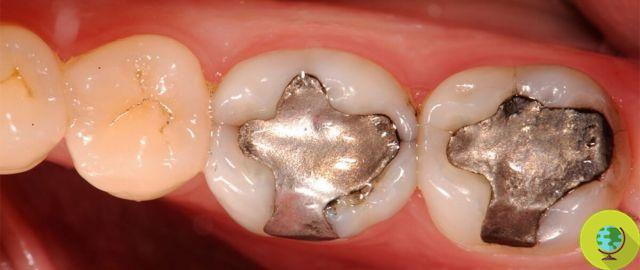
Mercury has been used for years and is still used today in dentistry for dental amalgams. But it is a highly toxic substance that poses a serious threat to human health
Don't store avocado like this: it's dangerousMercury has been around for years and is still used in today dentistry for the dental amalgams. But it is a highly toxic substance that poses a serious threat to human health.
The problem was raised by the European Parliament, which is fighting for a ban on mercury in Europe.
For this he has just cast his vote for ban the use of mercury in dentistry by 2022, but this is only a first step, given that the legislation proposed by the Parliament will have to be evaluated by the European Commission and the European Council.
In just one year in Europe in the dental sector they are used well 74 tons of mercury, a highly toxic substance that is considered a threat both to our health and to animals and the environment.
Read also: MERCURY: HERE ARE THE FOODS THAT HELP TO ELIMINATE IT FROM THE BODY
According to the legislation proposed by the European Parliament:
“Mercury exposure at high levels can cause damage to the brain, heart, kidney, lung and immune system of people of all ages. High levels of methylmercury in the bloodstream of unborn babies and children can harm the development of the nervous system, which reduces the ability of children to think and learn and can decrease the IQ. "
The European Parliament specifies how mercury is harmful to the environment and health, even outside the dental field:
"Most of the mercury emissions and risks associated with exposure derive from human activities, including the primary extraction and processing of mercury, the use of mercury in products, industrial processes traction of gold at an artisanal level and on small scale, contaminated sites and mercury emissions from coal combustion and mercury waste management in particular ”.
Read also: ZERO CARIES: 10 TIPS FOR THE DENTAL HEALTH OF CHILDREN
The mercury problem extends to other sectors because burning fossil fuels in power plants and industrial boilers, along with domestic heating, account for nearly half of global mercury emissions. Therefore, according to the European Parliament, it is appropriate to accelerate the transition towards renewable energy production and to boost energy efficiency measures to significantly reduce the release of mercury into the atmosphere.
However, not all operators in the dental sector agree with the complete ban on mercury amalgams, because at the moment there would not be sufficiently valid alternatives and because it will take years before these are available.
Read also: MICROGRANULES IN DENTALS: US DENTISTS FIND THEM IN THE GUMS OF PATIENTS
However, we must first think about the health of citizens so to avoid having to use mercury amalgam in case of caries and for tooth reconstruction first of all, the prevention of caries itself should be encouraged, starting with a greater awareness of dental hygiene to be spread among the population.
According to ANDI, the use of amalgams in dentistry is safe, while their removal can be problematic, because mercury vapors could be released by heat.
Read also: MERCURY: THE MOST COMMON SOURCES AND 10 REASONS WHY IT'S TOXIC TO OUR BODY
“Dental amalgam, produced by combining mercury and silver-based alloys, is a medical device that has always been used as a material for dental restorations. Its production and sale is regulated in Europe by directive 93 / 42Ce. To be placed on the market, each product must obtain, and carry on the packaging, the CE marking which proves its safety for the end user: the patient ", as underlined by ANDI.
The mercury in amalgam fillings spreads throughout the body
The WHO (World Health Organization) does not think so, which has already documented how since 1991 amalgam fillings are the primary source of mercury in the body: an alarming fact, considering its toxicity and the ability to negatively affect the immune system as well.
Contrary to what was once believed, mercury is able to gradually come out of the amalgam of fillings: phenomenon favored by normal chewing, by particular occlusal problems, by the consumption of hot drinks, by bruxism and even by the brushing of the teeth itself.
It is estimated after twenty years from the application of the filling, about 80% of the mercury is no longer present in the amalgam, and consequently has been absorbed by our body, as confirmed by studies carried out on saliva, on the vapors present in the cavity. oral and gum tissue biopsies.
From the oral cavity, mercury it can subjectively spread to the glands, thyroid, kidney, heart, nervous system, bone marrow, causing minor or major disturbances, depending on the organs involved and the individual ability to dispose of the substance (for example, through sweat, urine ...).
Headaches, dermatitis, chronic fatigue but also depression or even multiple sclerosis are some phenomena attributable to the toxicity of mercury. Fortunately, many of these phenomena proved reversible once mercury exposure was eliminated.
Given the strong doubts about the real safety of mercury amalgams the reference legislation in Europe could change in the coming years e already some dentists are preferring to use white composite or ceramic fillings instead of silver and mercury amalgams.
However, the problems for our health caused by exposure to mercury can be really serious and the European Parliament does not fail to refer to exposure to high levels of mercury, which can cause damage to the brain, heart, kidneys, lungs. and the immune system of people of all ages. High levels of methylmercury in the bloodstream of unborn babies and children can harm the development of the nervous system.
Given the problems related to mercury, a petition was born to ban this substance in dentistry as soon as possible.
Read here the mercury legislation in dentistry proposed by the European Parliament.
Sign here petition to ban mercury in dentistry.
Marta Albè


























